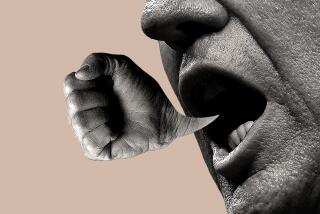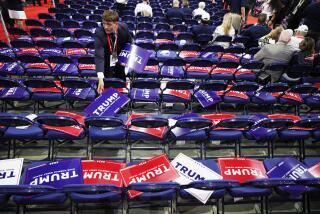Bush Allies Fear His Counterattack Lacks Hard Punch : Presidency: His backers say he needs a clear message or coherent theme on his nationwide trip if his new political effort is going to work.
- Share via
WASHINGTON — President Bush is stepping up his nationwide schedule of public appearances, hoping to turn back criticism of his handling of domestic affairs and reverse his fall in public opinion polls.
But as he takes to the road, political allies are warning that he must come up with a new message or some coherent theme if the new political effort is going to work--steps, they say, they are not convinced that Bush is yet prepared to take.
“We need to more clearly define where we stand in certain areas. We need to be positioned as having ideas with regard to the recession, even if it is to stand pat,” said one Republican with close ties to White House.
Another Republican activist--an expert on campaign image-making--was already skeptical about the White House counterattack, which was played out in Columbus, Ohio, on Monday and will take Bush to Florida, Mississippi, and San Bernardino next week before he attends ceremonies in Hawaii marking the 50th anniversary of the Japanese attack on Pearl Harbor on Dec. 7.
“It’s a disaster. They keep doing things that symbolize disarray,” the activist said. “It’s not focused. There’s no message.”
And one senior White House official complained: “The only message that’s coming is to try to ratchet up the heat on the Congress.”
In his Monday trip, there was little hint that Bush was tailoring his public message to the pressing economic issues that have grabbed voters’ attention and tugged at his standing in the polls. He steered clear of such matters in his public comments, spotlighting instead a subject that has not yet seemed to catch on with voters: education and the need to give parents a choice in the schools their children attend.
Nevertheless, said Charles Black, a Republican campaign consultant, the idea behind the increased travel “is to get out of Washington, get around the country, talk about economic issues and try to (convince) people that he is focusing on this issue. At the moment, he’s not prepared to push any new proposals or package. So the more he can show empathy on economic issues, the better.”
Meanwhile, with new polls showing no recovery from the drop in Bush’s approval ratings that has shocked the White House in recent weeks, the President is being pressured to unveil a completed campaign team that would gear up an election operation ahead of his original schedule. And there is intense pressure from some quarters to ditch White House Chief of Staff John H. Sununu.
A new Los Angeles Times poll shows 53% of voters approve of Bush’s job performance, while 41% disapprove--a 12-point decline in Bush’s positive score, and a similar increase in his negative rating, since a Sept. 21-25 Times survey.
Against that background, a group of congressional Republicans has called on Bush to remove Sununu. And within the Cabinet, said one well-informed Republican source, “there’s clear grumbling (about Sununu)--and that’s a very important constituency for any chief of staff.”
One senior White House official said that until Sununu’s future role and the shape of the White House political counterattack are resolved, “it looks to be a bit of a turbulent month coming up. It’s not going to be a cheery December around here.”
Reflecting the defensive and testy climate in which he finds himself, Bush on Monday scowled and gestured in disgust when a reporter asked when he planned to stop the “bleeding” at the White House.
“That’s the way I make my living,” he responded as he continued a conversation with teachers at his stop in Columbus.
In taking his campaign message to the heartland, Bush sought to put new distance between himself and Washington.
“The Beltway types may be afraid” of reforming the public school system, he said, making a derogatory reference to the highway that encircles the nation’s capital, “but I believe they are out of touch with the rank-and-file teachers who welcome reform.”
Bush’s refusal to be drawn into a discussion of the flap surrounding Sununu marked a continuation of White House efforts over the weekend, when First Lady Barbara Bush dismissed reports that she was unhappy with the chief of staff. “Big baloney,” she said.
But aides said Bush spent a substantial amount of time during the weekend on the telephone seeking the advice of longtime advisers. They said it appeared likely he would move within the next several weeks to announce the composition of his campaign team.
At the same time, well-placed Republican officials quoted senior White House assistants as saying Sununu’s job was in jeopardy. They described a frenzied mood among White House officials as campaign strategists scrambled to counter Democratic attacks that have accompanied the sagging economy.
Among the most worrisome attacks, the Republicans said, is a planned Democratic assault focused on health care issues.
White House officials concede that the Administration is at least weeks away from even preliminary agreement on what its health care policy should include. Such indecision, they say, may make it difficult to fend off the Democrats’ attacks.
The President’s message on Monday offered a reprise of his call for educational reforms as part of his “America 2000” program.
“This is not a liberal-versus-conservative fight,” he told high school students at Veterans Memorial Auditorium in Columbus. “It is a revolution against business as usual.”
More to Read
Get the L.A. Times Politics newsletter
Deeply reported insights into legislation, politics and policy from Sacramento, Washington and beyond. In your inbox twice per week.
You may occasionally receive promotional content from the Los Angeles Times.







